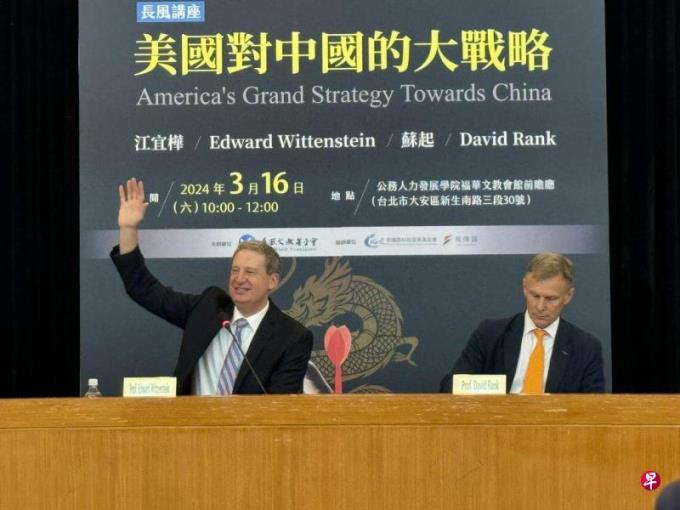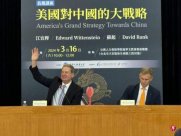
With the start of the US election, how Sino -US relations will change, causing the outside world to pay attention. David RANK, who was the U.S. Interim in China, pointed out on Saturday (March 16) at the symposium in Taipei.The United States will not use the Taiwan issue to cause war to weaken China. Instead, it is necessary to prevent Beijing from solving the Taiwan problem and put on the schedule.
The Taiwan Changfeng Foundation held a lecture on the "U.S. Great Strategy to China" on Saturday, inviting Edward Wittenstein, executive director of the Global Security Research Project of Jackson Global Affairs of Yale University, Ruan Dawei, a senior diplomat, and Ma Ying -jeouChangjiang Yihua, the Executive Yuan of the government period, and Su Qi, Secretary -General of the Guoan Council.
Before visiting Taiwan, Wittenstan and others led the visiting group of Jackson Global Affairs of Yale University to conduct a four -day visit in Beijing.During the period, in addition to a exchange on the challenges of Sino -US relations at Renmin University of China, he also met with some former Chinese military and diplomatic officials.
Talking about this Beijing trip, Wittenesttan said during the discussion on Saturday that the trip repeatedly heard that Lu Fang mentioned that "the issue of Taiwan cannot be left to the next generation".Although the land side did not mention the specific timetable, he was still worried about it.
He also mentioned that when he visited Beijing this time, the government officials and the taxi driver all went to China's economy is worried , and the decline in economic performance is more likely to affect the legitimacy of the Communist Party of China. The United States and Taiwan should pay close attention to whether Beijing may use the issue of Taiwan to transfer internal attention.
Ruan Dawei said that today's challenges in response to China may be one of the few consensus between the United States Democracy and Republican Party.He believes that the current U.S. and Taiwan's goals should be as much as possible to allow Taiwan's problems not to appear on the list of leaders of mainland China, "let him give priority to dealing with many other troubles."
He further pointed out in the Q & A session that a responsible foreign policy maker will not try to use the Taiwan issue to provoke China and even provoke war to weaken China.
Ruan Dawei said that similar to Perosi, the president of the American Council in 2022, and even Taiwan ’s independence, etc., all were the behaviors that forced Beijing to make their statements.If Beijing will be avoided to solve the schedule of Taiwan, these behaviors should be avoided.
But he also believes that it is difficult for the United States to make Beijing more difficult to deal with Taiwan.
Ruan Dawei is currently a senior researcher at Yale University. He has served in the United States State Department for 27 years, knowing many languages such as Chinese and French.He once worked in Beijing, Taipei, and Shanghai. In 2016, he served as the Interim Office of the US Embassy in China (equivalent to the Ambassador). The following year, he resigned because he did not agree with President Trump withdrew from the Paris Agreement.
Wittenstan also believes that the conflict between the Taiwan Straits is an absolute disaster to the world, and no one in Washington will think it is a feasible direction.
He also described the current situation of the Taiwan Strait before the state before the First War, saying that Beijing will continue to use the gray area tactics, such as in the field of network, or Risks in the controversial sea area to test the response of various countries.
Su Qi questioned the United States' willingness to overestimate Taiwanese wars in the discussion, and pointed out that the United States "if it continues to believe that Taiwan and Ukraine have the same willingness to combat, it is a big mistake."In response, Wittenstan said that improving the awareness of risk defense in Taiwan is not to refuel on fire, but to keep everyone not complacent.
Ruan Dawei admits that if Taiwanese themselves are unwilling to defend Taiwan, it is unreasonable to expect Americans to do this.



